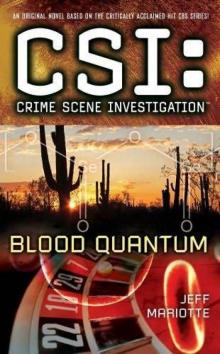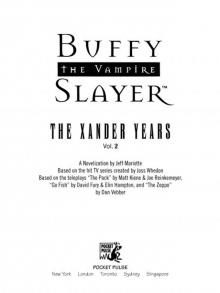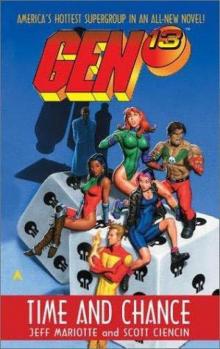- Home
- Jeff Mariotte
Time and Chance
Time and Chance Read online
PROLOGUE
The building seemed to have been carved from the side of the mountain itself, or to have grown organically from the granite and ice surrounding it.
But the term "building," Frank Parkhurst thought, barely described Schloss Reitberger. "Fortress" was more accurate.
Frank scoped it out through powerful binoculars from the patio of the Hotel Rheingarten, two miles away. The day was crisp and clear as only Alpine days can be, and two miles, in this air, was like nothing. The sun beat down on his parka and felt warm on his cheeks and forehead, but he knew the temperature hovered somewhere around freezing.
This exercise was for his own amusement, primarily— he'd seen the satellite photos and the building plans and the schematics showing electrical, plumbing, and ventilation systems. The stone walls, he knew, were three feet thick. Fifteen feet tall. Topped with coils of barbed wire, interwoven with strands of electrified wire, and inlaid with ground glass. Guard towers at the corners of the rectangular compound were staffed 24/7, and the guards were equipped with machine guns, grenade launchers, and searchlights.
Inside the walls, another thirty soldiers lived. When they weren't on guard duty, they were drilling, honing armed and unarmed combat skills, catching up on the latest high-tech weaponry, or resting for their shifts in the towers.
The ground below the walls was peppered with hidden land mines. The road—the only real approach to the compound, since it backed up to the mountain—was watched at all times, by guards and cameras.
Herr Reitberger was a very cautious man. It would take an army to break into this place.
Frank had a squad of ten.
He smiled, capped the binoculars.
Cake walk.
He went inside.
They made their move at sunrise.
The compound's west side faced into the mountain. As soon as the sun broke over the mountains to the east, across the valley, its rays would shine into the eyes of guards in the tower. They wouldn't be blinded, Wager had assured Frank. But they'd be inconvenienced. They'd be unlikely, at that moment, to be looking toward the east, or anywhere outside of the shelter of their own towers.
It wasn't much of an edge, but you took every edge you could get, was how Frank looked at it.
The moment the sun's first golden-red rays struck the walls of the Schloss, a truck swung into view around the last bend before the straight stretch of road that led to the compound's gate. It was a furniture delivery van, hired by Frank a week before to make an attempt to deliver three couches to Klaus Reitberger at exactly this time.
The delivery attempt would, of course, be unsuccessful. The driver and his assistant would grumble and curse, but Reitberger's men would check their boss's receiving list and, not finding any record of furniture delivery, would send them on their way.
If they lived that long.
Frank wanted the truck there as a distraction, another edge. He didn't care if the driver actually got to explain to the gate guards what they were bringing up. He planned to be in action by then.
He wouldn't be coming from the east, up the road.
He would be coming from the sky.
The truck's appearance was the agreed-upon cue. On the snowy slope above Schloss Reitberger, seven men and three women saw it and flicked the switches that ignited the powerful engines in their flight packs.
"Under way," Frank said softly, as if to himself.
"I see," Wager's voice said in his ear. Wager sounded confident and assured, as usual.
Each soldier's helmet contained a microscopic camera. The signals were beamed via satellite to Wager's headquarters in New York City. Wager would, Frank was sure, be sitting in an expensive chair before a bank of monitors, a tall glass of cranberry juice over ice close at hand. He would watch the entire operation, making whatever comments he deemed necessary.
That was fine with Frank. The man paid the bills. And he was as smart as they came.
Ten flight packs, set on whisper mode, punched the snow and kicked up a dense cloud. Within seconds, from inside the cloud, the airborne squad floated into the air.
Each soldier knew the route. It wasn't complicated: passing over the outcropping they started on would put them directly above Schloss Reitberger, about two hundred yards below them. They'd need to drop fast—even on whisper mode, the flight packs weren't utterly silent. But they were as quiet as International Operations technicians could make them.
Wager had assured Frank that at this time of the morning, with the sun rising and the truck hauling up the carefully watched road, the chances of anyone looking straight up into the sky were point zero seven percent. Not impossible, but slim.
Good odds, anyway. And Wager had gotten where he was by playing the odds. Playing, and winning.
As many times as he'd used the flight packs, in practice, Frank had never quite become accustomed to the sensation. He was flying. Head up, feet down, as if standing, but the ground was a couple of dozen feet below. He was in the air, untethered to the ground, with only a slight thrumming sensation and a smell like burning diesel and a shushing sound like tires on wet pavement to remind him of what was holding him up.
"Precipice," Frank said. They approached the edge. As soon as they passed over, the compound would be in sight, and then the real danger would begin.
Twenty feet ahead, the world seemed to end.
The snowfield came to an abrupt halt, and there was a sheer drop-off, the cliff into which Schloss Reitberger was built. Frank had gone over this hundreds of times in his head, on paper, and in drills. But as the real edge loomed, he felt a moment's hesitation. Being twenty feet off the ground was one thing. In less than a second, he'd be hundreds of feet up.
Enemies with guns below.
"Don't worry, the packs will work fine," Wager's voice said.
Frank was sure he hadn't said anything, but in this situation, it was entirely probable that anyone would be a little nervous. Wager would, of course, know that.
Then he was past the snow. A moment of vertigo as the cliff's face fell away beneath his feet, and then he was looking at the others, all in line with him, all feeling the same thing. He looked down.
The Schloss looked just like the satellite photos had shown.
He pointed down. The others nodded and adjusted their directional controls, their speed controls.
They dropped like stones.
Ten seconds into the descent, Frank aimed his automatic rifle down toward the Schloss. The others followed suit.
Fifteen seconds in, they were spotted.
Seventeen seconds in, they were even with the guard towers.
But they had the edge. They knew they were dropping down from nowhere. They knew there would be hostile guards to meet them.
The guards, however, were taken completely by surprise.
Frank's squad opened fire, and the tower guards were dead before an alarm could even be raised.
The gate guards were slow in turning away from the unknown delivery truck. Frank targeted them, squeezed the trigger. His gun spat tracer rounds even as his knees buckled.
"I'm down," he said.
"One of them's still alive!" Wager's voice said urgently.
Frank and two of the others fired as one. The guard who had been struggling to turn over jerked twice and fell into a corner.
Wager could see the action from more angles than any one soldier on site. And he would have known there was a certain probability of at least one guard being wounded but not immediately killed. He would know what that probability was, and he would know the best course of action to take to circumvent it.
Sometimes, Frank thought, it's almost boring to work for the guy who's always right.
"Wa
tch the barracks!" Wager's voice said.
Frank and the others turned to the barracks. As the doors flew open, their guns were already firing. The guards trying to spill outside were stopped in their tracks by the hail of bullets.
"He's in the main house," Wager's voice said. "Go."
This was, so far, all according to plan. Frank motioned to three of his squad, two men and a woman. The others remained in defensive positions, weapons trained on the barracks in case the soldiers inside made another dash.
Frank and his three went to the main house, a palatial residence with turrets and oversized doorways and balconies on which the owner could take the air on warm summer days. This was October, though; summer had been over here for a couple of months. The balconies were iced over, and snow caked the sloped roofs of the turrets.
The front door was locked. Behind it, there would be more armed guards.
Frank unlocked it with a healthy amount of C-4.
He and the other three took positions at angles from the doorway. As soon as the charge blew the door to slivers, they fired through the doorway at every angle.
When they ran up the steps and into the house, the marble entryway was smoky and there was no one left inside who was still breathing.
"We're in," Frank said.
"He's got a safe room somewhere," Wager said. "They moved him there as soon as the first shots were fired, along with some guards."
Frank knew Wager was right. That's what he'd have done, if he were running security for a guy like Reitberger. You had a hardened room, with reinforced walls and door, somewhere in the interior. You had people inside it and out, and they defended it no matter what, because their job was to make sure that no harm came to the one who paid their salaries.
"Up or down?" Frank asked.
"We think he sleeps upstairs, and they'd probably want it close to that because any attack would be more likely to come at night," Wager replied. "But down would be closer to an escape route—I expect, a tunnel dug into the mountain, probably coming out near the road somewhere away from the Schloss. They'll have cars there."
"Which is it?"
There was one thing they hadn't been able to determine from the photos and blueprints—which room had been hardened.
Moments ticked away.
"Boss…"
"Down," Wager said at last. "Eighty-seven percent probability. If you're going to move from up to down, you're going to want to do it before the house is breached, not after. There's no escape from upstairs. Got to be down."
"Down!" Frank shouted, even though everyone had an earpiece. Everyone could hear Wager's words.
They moved through the smoke and found the staircase that led downstairs. Frank stopped at the top of the stairs, tossed three flash-bang grenades down, one after the other.
They boomed, echoed in the stairwell. Anyone down there would be blinded and deafened.
As he started down the stairs, he heard gunfire from outside.
"The guards in the barracks taking another stab at it," Wager said. "Your people will be fine."
Frank led the way, crouched over, his weapon held at knee level. The bottom of the staircase was empty, but there was a door at the end of a short hallway. It looked like steel. Inside the door were two slots, big enough for gun barrels.
"There they are," he said.
"Blow it," Wager ordered.
Frank gestured to Zell, who carried a grenade launcher instead of an automatic weapon. He hadn't had a chance to fire since they landed.
'Take it out," Frank said.
Zell nodded once. The others pressed themselves into the staircase, eyes clenched tight, hands over their ears. Zell swung his weapon into the hallway and squeezed the trigger.
Guns barked from behind the door, bullets spanging down the hallway.
Zell whipped his launcher and arms back around the corner, curling himself into a ball on the floor.
The explosion shook the building. Smoke billowed from the hallway. In spite of ear plugs, Frank's ears rang.
The gunfire from the door had stopped, though. When he looked around the comer, the door was down. A couple of people moved around through the smoke, beyond the doorway. Frank fired on them, tracers whooshing through the smoke. He heard screams.
When there was no more movement from beyond the doorway, Frank led his team in.
Klaus Reitberger and two guards were still alive inside. Reitberger sat in a big padded chair, legs curled up under himself, his hands under his knees. The guards stood on either side of him.
Reitberger was terrified. He was not a soldier. He was a rich man who dabbled in dangerous trades—an arms dealer, an extortionist, a smuggler, a thief. But he was soft, pudgy, with long silver hair and small-lensed glasses and a round stomach that quivered under silk pajamas.
His guards held automatic weapons, but they didn't look as if they were inclined to use them. Frank made a downward motion with one hand, and they both put their weapons on the ground.
Reitberger looked at them, head swiveling from one to the other. The expression on his face was pure terror. His jaw was slack, mouth hanging open. A trace of spittle glistened at one corner.
His voice caught when he tried to speak.
"Wh—what do you want?" he demanded.
"He's speaking English," Wager said. "That means he knows you're there for me."
"You know what we want," Frank said. "Wager sends his regards."
"I—" Reitberger started. "I can't. Tell Herr Wager that I don't have it anymore. I offered to sell it to him first, but when he turned down my offer, I found another buyer."
"You tell him," Frank suggested.
The man didn't realize he already had.
"No, I—I don't want to talk to him again. He frightens me."
"You look pretty scared right now, pal," Frank said. "And Wager isn't even in the room."
"He's lying," Wager's voice said. "If he'd sold, I'd have heard about it. Sixty-eight percent chance the stuff is right there in the room."
"You're lying," Frank said. He made a show of inspecting the room's furniture—several chairs, a table, a television, some cabinetry, a small refrigerator. You could spend a few hours in here without much trouble. Another doorway opened into a bathroom. "And I don't have all day. You can hand it over, or I can kill you and look for it. I'm sure I won't have to look far."
"I offered it to Herr Wager at a fair price. He wouldn't pay it. What right has he…"
"The price was ridiculous," Wager said. "An insult."
"The price was ridiculous," Frank repeated. You don't insult Wager. He's no fool."
"I never said he was," Reitberger protested. Behind his thick lenses, tears welled in his eyes.
"You treated him as if he were," Frank said.
"Reitberger isn't brave," Wager said in Frank's ear. "Threaten him—ninety percent chance he'll turn it over."
Frank advanced on Reitberger. The man quivered as he approached, but didn't move away. Bolder than Wager believed? Frank gripped a handful of Reitberger's silver hair and yanked his head back, so he was looking up into Frank's narrow eyes. The man's breath smelled of garlic. Frank shoved the muzzle of his gun against Reitberger's jaw, hard enough to break the skin. Reitberger let out a whimper.
"Now you give him the serum for free," Frank said, "and you live another day. Or you make it hard for me and you die right now. Your call, Herr Reitberger. What's it going to be?"
"Okay, fine," Reitberger said. "He can have it." Frank released him and he crossed to the refrigerator, tugged open the door. Frank tracked his every step with the automatic.
Inside the refrigerator there was milk, beer, cold cuts, bread, cheese, fruit. There was also a stainless steel rack, and inside the rack were four glass vials containing an odd, greenish liquid. It looked like dishwashing soap to Frank. But instead of having the sparkling shine of soap, it was dull, cloudy.
Reitberger handed the rack to Frank. Frank held it up before him. Seemed like an a
wful lot of trouble and expense, not to mention death, for this stuff.
"That's it, huh?" he asked.
"Yes," Reitberger assured him. "That's all there is. Be very careful with it."
But Frank hadn't been addressing Reitberger. 'That's it," Wager echoed. "Well done. Tell him thank you, for me."
"Very well," Frank said. "Pleasure doing business, and all that. We'll just be on our way now."
"Finish it," Wager said.
Frank nodded, and at the prearranged signal, the other three soldiers opened fire. The two guards and Herr Klaus Reitberger performed a grisly dance as the bullets ripped into them.
An ocean away, in New York City, Wager smiled. He could barely restrain from rubbing his hands together in glee.
"That's the stuff you've been after?" Suzanne Sawyer asked.
"That's it exactly," Wager said. He studied Suzanne— tall and muscular, with her close-cropped platinum hair, powerful body, and a fighter's stance. He tried to keep her close by at all times, to watch his back, to protect him against any threat that might arise. In his entire organization, she was the person he trusted most, and the one with whom he was happiest to share this moment of triumph. He knew she'd understand. She had been at his side through the months of struggle to reach this point, and she would be there through the time of triumph that followed.
Unless, of course, she ever betrayed him in any way, at which point he'd have to kill her.
"So what's next?" she asked. "You take the stuff?"
"I will," Wager said. He lifted his glass of cranberry juice, swirled it, making the ice cubes clink in the glass and releasing the fruity aroma. "But not right away. I need to know more about it, and I need to understand exactly how it will react with my particular body chemistry. I need to run a few tests." He took a drink, and used a remote to turn off the bank of television monitors, which were currently displaying his squad's violent departure from Schloss Reitberger.
"I need," he said, "a test subject. And I know just where to look for one…"
CHAPTER ONE
A frigid wind blew in off the Hudson, whistling through Manhattan's concrete canyons and making people pull their coats tighter, shove hands into their pockets or over their ears, and complain bitterly through clenched teeth that yes, the weather had finally changed, and it looked like the winter would be a hard one after all.

 City Under the Sand
City Under the Sand The Burning Season
The Burning Season Sanctuary
Sanctuary Winds of the Wild Sea
Winds of the Wild Sea Serpents in the Garden
Serpents in the Garden Close to the Ground
Close to the Ground Blood Quantum
Blood Quantum Brass in Pocket
Brass in Pocket City Under the Sand: A Dark Sun Novel (Dungeons & Dragons: Dark Sun)
City Under the Sand: A Dark Sun Novel (Dungeons & Dragons: Dark Sun) Witch's Canyon
Witch's Canyon STAR TREK: The Lost Era - 2355-2357 - Deny Thy Father
STAR TREK: The Lost Era - 2355-2357 - Deny Thy Father Dawn of the Ice Bear
Dawn of the Ice Bear The Xander Years, Vol.2
The Xander Years, Vol.2 Ghost of the Wall
Ghost of the Wall 30 Days of Night: Light of Day
30 Days of Night: Light of Day Deny Thy Father
Deny Thy Father Criminal Minds
Criminal Minds Time and Chance
Time and Chance The Folded World
The Folded World Bolthole
Bolthole Narcos
Narcos Right to Die
Right to Die